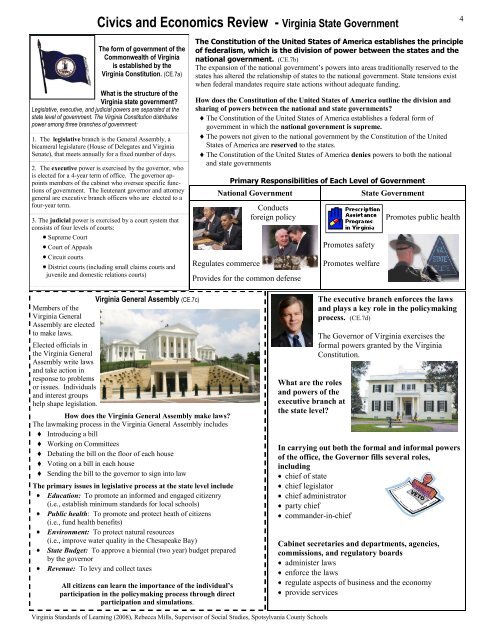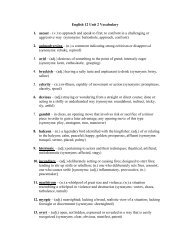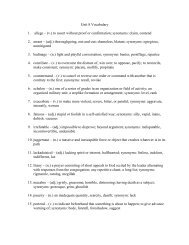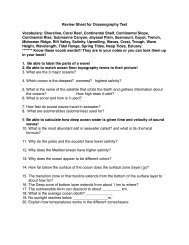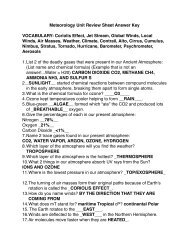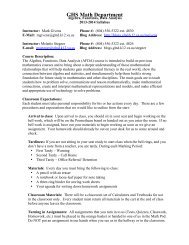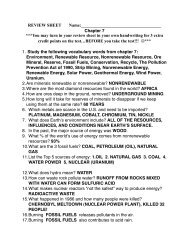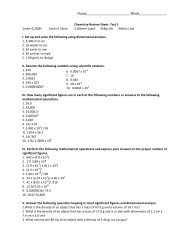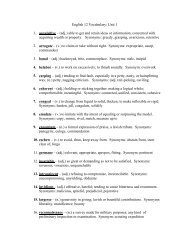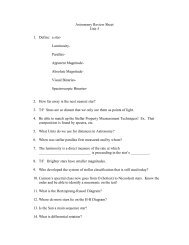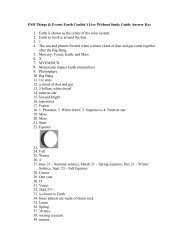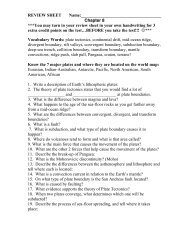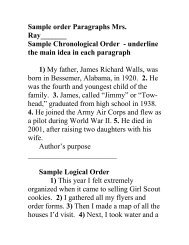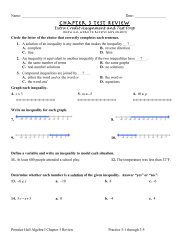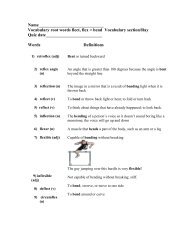Civics and Economics Review - Documents, Principles, Citizenship
Civics and Economics Review - Documents, Principles, Citizenship
Civics and Economics Review - Documents, Principles, Citizenship
Create successful ePaper yourself
Turn your PDF publications into a flip-book with our unique Google optimized e-Paper software.
<strong>Civics</strong> <strong>and</strong> <strong>Economics</strong> <strong>Review</strong> - Virginia State Government<br />
4<br />
The form of government of the<br />
Commonwealth of Virginia<br />
is established by the<br />
Virginia Constitution. (CE.7a)<br />
What is the structure of the<br />
Virginia state government?<br />
Legislative, executive, <strong>and</strong> judicial powers are separated at the<br />
state level of government. The Virginia Constitution distributes<br />
power among three branches of government:<br />
1. The legislative branch is the General Assembly, a<br />
bicameral legislature (House of Delegates <strong>and</strong> Virginia<br />
Senate), that meets annually for a fixed number of days.<br />
2. The executive power is exercised by the governor, who<br />
is elected for a 4-year term of office. The governor appoints<br />
members of the cabinet who oversee specific functions<br />
of government. The lieutenant governor <strong>and</strong> attorney<br />
general are executive branch officers who are elected to a<br />
four-year term.<br />
3. The judicial power is exercised by a court system that<br />
consists of four levels of courts:<br />
Supreme Court<br />
Court of Appeals<br />
Circuit courts<br />
District courts (including small claims courts <strong>and</strong><br />
juvenile <strong>and</strong> domestic relations courts)<br />
The Constitution of the United States of America establishes the principle<br />
of federalism, which is the division of power between the states <strong>and</strong> the<br />
national government. (CE.7b)<br />
<br />
states has altered the relationship of states to the national government. State tensions exist<br />
when federal m<strong>and</strong>ates require state actions without adequate funding.<br />
How does the Constitution of the United States of America outline the division <strong>and</strong><br />
sharing of powers between the national <strong>and</strong> state governments?<br />
The Constitution of the United States of America establishes a federal form of<br />
government in which the national government is supreme.<br />
The powers not given to the national government by the Constitution of the United<br />
States of America are reserved to the states.<br />
The Constitution of the United States of America denies powers to both the national<br />
<strong>and</strong> state governments<br />
Primary Responsibilities of Each Level of Government<br />
National Government<br />
Regulates commerce<br />
Conducts<br />
foreign policy<br />
Provides for the common defense<br />
Promotes safety<br />
Promotes welfare<br />
State Government<br />
Promotes public health<br />
Virginia General Assembly (CE.7c)<br />
Members of the<br />
Virginia General<br />
Assembly are elected<br />
to make laws.<br />
Elected officials in<br />
the Virginia General<br />
Assembly write laws<br />
<strong>and</strong> take action in<br />
response to problems<br />
or issues. Individuals<br />
<strong>and</strong> interest groups<br />
help shape legislation.<br />
How does the Virginia General Assembly make laws?<br />
The lawmaking process in the Virginia General Assembly includes<br />
Introducing a bill<br />
Working on Committees<br />
Debating the bill on the floor of each house<br />
Voting on a bill in each house<br />
Sending the bill to the governor to sign into law<br />
The primary issues in legislative process at the state level include<br />
Education: To promote an informed <strong>and</strong> engaged citizenry<br />
(i.e., establish minimum st<strong>and</strong>ards for local schools)<br />
Public health: To promote <strong>and</strong> protect heath of citizens<br />
(i.e., fund health benefits)<br />
Environment: To protect natural resources<br />
(i.e., improve water quality in the Chesapeake Bay)<br />
State Budget: To approve a biennial (two year) budget prepared<br />
by the governor<br />
Revenue: To levy <strong>and</strong> collect taxes<br />
<br />
participation in the policymaking process through direct<br />
participation <strong>and</strong> simulations.<br />
What are the roles<br />
<strong>and</strong> powers of the<br />
executive branch at<br />
the state level?<br />
The executive branch enforces the laws<br />
<strong>and</strong> plays a key role in the policymaking<br />
process. (CE.7d)<br />
The Governor of Virginia exercises the<br />
formal powers granted by the Virginia<br />
Constitution.<br />
In carrying out both the formal <strong>and</strong> informal powers<br />
of the office, the Governor fills several roles,<br />
including<br />
chief of state<br />
chief legislator<br />
chief administrator<br />
party chief<br />
comm<strong>and</strong>er-in-chief<br />
Cabinet secretaries <strong>and</strong> departments, agencies,<br />
commissions, <strong>and</strong> regulatory boards<br />
administer laws<br />
enforce the laws<br />
regulate aspects of business <strong>and</strong> the economy<br />
provide services<br />
Virginia St<strong>and</strong>ards of Learning (2008), Rebecca Mills, Supervisor of Social Studies, Spotsylvania County Schools


